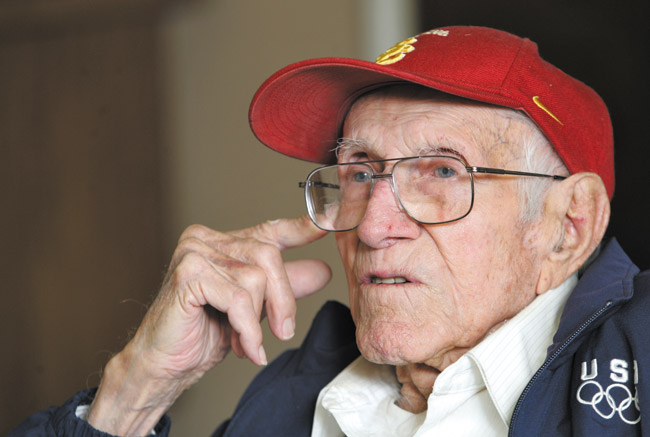The Movie Misses The Best Parts

World War II prisoner of war, Olympic runner and inspirational speaker Louis Zamperini, 94, during an interview held aboard the Battleship Missouri Memorial in 2011 CINDY ELLEN RUSSELL / STAR-ADVERTISER PHOTO
Like many who have read Laura Hillenbrand’s book Unbroken, the impeccably researched story of Olympic runner Louie Zamperini, the film version was greatly anticipated — even more so for my wife Susan and me, because we were part of a small, ad-hoc group that organized Zamperini’s visit to Oahu a few years ago when he spoke to several hundred Marines and sailors aboard the USS Missouri.
The story, briefly, is of a bright, high-spirited, live-onthe-edge kid raised in the small town of Torrance, Calif. Because he was frequently in trouble with local cops for petty crimes, he learned how to run very fast. He honed his running skills to the point of eventually making the varsity track squad at University of Southern California, and qualifying for the 1936 U.S. Olympic team to compete in Germany. He was a shoo-in for the 1940 team to compete in Japan, but the onset of World War II made those games impossible, so instead — like many of his “Greatest Generation” contemporaries — he enlisted in the military.
In May of 1947, as an Army Air Corps bombardier, his crippled, Hawaii-based B-24 bomber crashed into the Pacific. He and a fellow crewman survived in a rubber life raft, drifting westward for 47 days. Ultimately, they were captured by a Japanese patrol boat, then transferred to a prison ship to Japan, where they were POWs for the next two years.
Zamperini’s time as a POW was made even more hellish by a certain Japanese prison commander, who knew of Zamperini’s Olympic experience and immediately detected the American’s defiant attitude. “The Bird,” as he was known by the POWs, hounded him mercilessly, administering frequent beatings without reason. He singled him out for the hardest prison work details, grinding him down physically and mentally. “Zamp” became obsessed by his hatred for The Bird, vowing revenge no matter how far off in the future.
The war ended in August 1945. The POWs were repatriated, and Zamp’s homecoming with his family was all he had hoped for. Because of his Olympian fame, he got more press and adoration than the average returnee. There was enormous interest in hearing him speak. He soon met and married a 20-year-old beauty named Cynthia Applewhite. He couldn’t believe his good fortune when she accepted his proposal. Even then, he doubted his worthiness.
This was only the first of many doubts that would haunt him. The social whirl and demand for his presence started going to his head. He started drinking more of the drinks people wanted to buy him. Soon he was adding whiskey to a normal cup of coffee at breakfast. He had become more and more obsessed by his hatred for The Bird. He would plot in his stupored mind how he would return to Japan to hunt down and kill The Bird. He had nightmares about his POW days.
He began to mistreat Cynthia, who was now pregnant. She attended a revival session, held in a tent near their Hollywood apartment. She urged Louie to come and listen to the words of a young preacher named Billy Graham. He did, but when Graham announced the alter call, Louie “took Cynthia by the arm and bulled their way from the tent.” When she threatened divorce, he gave in once more. The next night, when Graham invited the alter call, Louie stood up in that back row of the tent ready for another fast exit. But suddenly he had a flashback: He was lying on the bottom of a rubber raft, and he recalled a promise he had forgotten until that very moment: “God, if you will save me, I will serve you for the rest of my life.” This was the last flashback he would ever have.
The next morning he lay still next to Cynthia. As Hillenbrand wrote: “What was resonating with him now was not all that he had suffered, but the divine love he believed had intervened to save him. He was not the worthless, broken, forsaken man Bird had striven to make of him. In a single silent moment, his rage, his fear, his humiliation and helplessness had fallen away. That morning he believed he was a new creation. Softly, he wept.”
The shame is that the movie ended right after his release from the Japanese prison and portrayed none of his struggle to forgive and move on — a struggle in many ways more difficult than the years as a POW. Ultimately, the message of Unbroken is about the redeeming qualities of forgiveness. All of this was only summarized in three brief paragraphs of script at the end of the film — a real disappointment for those who had read the book.
coffee1776@gmail.com





